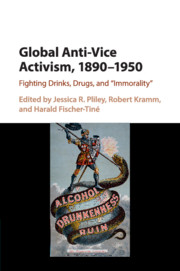18 results
Rethinking Transnational Activism through Regional Perspectives: Reflections, Literatures and Cases
-
- Journal:
- Transactions of the Royal Historical Society , First View
- Published online by Cambridge University Press:
- 08 January 2024, pp. 1-27
-
- Article
-
- You have access
- Open access
- HTML
- Export citation
Transdisciplinary Philosophy of Science: Meeting the Challenge of Indigenous Expertise
-
- Journal:
- Philosophy of Science ,
- Published online by Cambridge University Press:
- 04 October 2023, pp. 1-11
-
- Article
-
- You have access
- Open access
- HTML
- Export citation
Doing Utopia: Radical utopian communities, mobility, and the body in the early twentieth century
-
- Journal:
- Journal of Global History / Volume 19 / Issue 1 / March 2024
- Published online by Cambridge University Press:
- 28 February 2023, pp. 57-76
- Print publication:
- March 2024
-
- Article
-
- You have access
- Open access
- HTML
- Export citation
Remembering Asia's World War Two. Edited by Mark R. Frost, Daniel Schumacher, and Edward Vickers. New York: Routledge, 2019. xix, 288 pp. ISBN: 9780367111328 (cloth).
-
- Journal:
- The Journal of Asian Studies / Volume 80 / Issue 4 / November 2021
- Published online by Cambridge University Press:
- 10 January 2022, pp. 1144-1146
- Print publication:
- November 2021
-
- Article
- Export citation
Trans-Imperial Anarchism: Cooperatist communalist theory and practice in imperial Japan
-
- Journal:
- Modern Asian Studies / Volume 55 / Issue 2 / March 2021
- Published online by Cambridge University Press:
- 06 May 2020, pp. 552-586
- Print publication:
- March 2021
-
- Article
-
- You have access
- Open access
- HTML
- Export citation
13 - “Hey, GI, want pretty flower girl?”: venereal disease, sanitation, and geopolitics in US-occupied Japan and Korea, 1945–1948
- from PART III - PROSTITUTION AND SEX TRAFFICKING
-
-
- Book:
- Global Anti-Vice Activism, 1890–1950
- Published online:
- 05 July 2016
- Print publication:
- 04 July 2016, pp 290-312
-
- Chapter
- Export citation
Notes on contributors
-
- Book:
- Global Anti-Vice Activism, 1890–1950
- Published online:
- 05 July 2016
- Print publication:
- 04 July 2016, pp ix-xiv
-
- Chapter
- Export citation
List of tables
-
- Book:
- Global Anti-Vice Activism, 1890–1950
- Published online:
- 05 July 2016
- Print publication:
- 04 July 2016, pp viii-viii
-
- Chapter
- Export citation
Index
-
- Book:
- Global Anti-Vice Activism, 1890–1950
- Published online:
- 05 July 2016
- Print publication:
- 04 July 2016, pp 325-333
-
- Chapter
- Export citation
PART I - HEALTH AND THE BODY
-
- Book:
- Global Anti-Vice Activism, 1890–1950
- Published online:
- 05 July 2016
- Print publication:
- 04 July 2016, pp 31-32
-
- Chapter
- Export citation
PART III - PROSTITUTION AND SEX TRAFFICKING
-
- Book:
- Global Anti-Vice Activism, 1890–1950
- Published online:
- 05 July 2016
- Print publication:
- 04 July 2016, pp 219-220
-
- Chapter
- Export citation
PART II - DRINKS AND DRUGS
-
- Book:
- Global Anti-Vice Activism, 1890–1950
- Published online:
- 05 July 2016
- Print publication:
- 04 July 2016, pp 101-102
-
- Chapter
- Export citation
List of figures
-
- Book:
- Global Anti-Vice Activism, 1890–1950
- Published online:
- 05 July 2016
- Print publication:
- 04 July 2016, pp vii-vii
-
- Chapter
- Export citation
1 - Introduction: a plea for a “vicious turn” in global history
-
-
- Book:
- Global Anti-Vice Activism, 1890–1950
- Published online:
- 05 July 2016
- Print publication:
- 04 July 2016, pp 1-30
-
- Chapter
- Export citation

Global Anti-Vice Activism, 1890–1950
- Fighting Drinks, Drugs, and 'Immorality'
-
- Published online:
- 05 July 2016
- Print publication:
- 04 July 2016
Frontmatter
-
- Book:
- Global Anti-Vice Activism, 1890–1950
- Published online:
- 05 July 2016
- Print publication:
- 04 July 2016, pp i-iv
-
- Chapter
- Export citation
Acknowledgments
-
- Book:
- Global Anti-Vice Activism, 1890–1950
- Published online:
- 05 July 2016
- Print publication:
- 04 July 2016, pp xv-xvi
-
- Chapter
- Export citation
Contents
-
- Book:
- Global Anti-Vice Activism, 1890–1950
- Published online:
- 05 July 2016
- Print publication:
- 04 July 2016, pp v-vi
-
- Chapter
- Export citation

